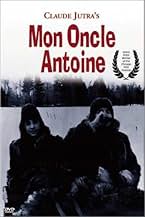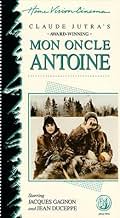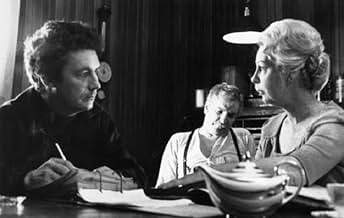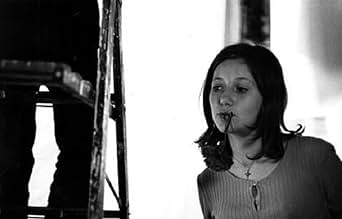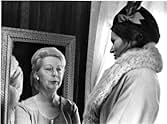Set in cold rural Quebec at Christmas time, we follow the coming of age of a young boy and the life of his family which owns the town's general store and undertaking business.Set in cold rural Quebec at Christmas time, we follow the coming of age of a young boy and the life of his family which owns the town's general store and undertaking business.Set in cold rural Quebec at Christmas time, we follow the coming of age of a young boy and the life of his family which owns the town's general store and undertaking business.
- Awards
- 6 wins & 2 nominations total
- Le cure
- (as René Salvatore Catta)
Featured reviews
Despite having a heavy film industry presence (usually American productions looking for cheap locations), Canada's own gems have often gone by the wayside. We're too close to America to really for it to care enough about a film not about its own country, and too far from overseas to have the exotic flare found in European or Asian cinema. Perhaps that is why the film considered Canada's best goes so widely underseen and overlooked. Claude Jutra's classic Mon Oncle Antoine truly is one of the best Canadian films ever made. It's also one of my favourite films, period. It is now out in a lovely 2 disc package from the folks at Criterion.
Set in an early 1940s Quebec asbestos mining town, it's a coming of age story over the course of a few days at Christmas time. Adolescent Benoit lives with his uncle, Antoine, his aunt, and a teenage girl, Carmen, who the family houses and employs at their store. Antoine not only owns the local general store, but is the local undertaker as well, among other things.
The film floats around, with no real plot-wise direction. Events happen in a relaxed and patient fashion, not to highlight story, but to highlight the emotional development of Benoit as he transforms from a free spirited adolescent into adulthood. He experiences the sexual passions, the harsh indifferences and the cynicism of leaving childhood behind. Jutra balances light hearted humour and charm with dark pathos and sadness with a deft hand. There are playful moments between Antoine and Carmen, and comedy with the sneaky Fernand (played by Jutra himself), who runs the store for Antoine when he's not chasing the uncle's wife. There is also a moment of great triumph when Benoit and another boy throw snowballs at the mine owner as he makes his way through town giving out small gift bags for Christmas rather than raises or bonuses to the men as the soundtrack blares a score fit for a spaghetti western.
On the darker side, there is a separate story where a family's father leaves the mines and heads to the logging camps. While he is away, his eldest son takes ill, and dies on Christmas Eve. Antoine is phoned to come pick up the boy's body, and Benoit insists he go along. The long sleigh ride through a snow storm offers him opportunities for mischief, but in the end leaves him with sad realizations about the nature of adulthood and those around him.
Mon Oncle Antoine is certainly about the loss of innocence, but it is also more than just a story about a boy in rural Quebec. It is a parable about the coming of age of the province itself. Most of the mines were owned by either Americans or English speaking Canadians, as referenced by the film when the mine foreman speaks in English to his French workers who do not understand. The time period is the Maurice Duplessis era - he was the premier of Quebec with his Union Nationale. His party was deeply conservative, pro-business, rabidly anti-socialist (in any form), and formed deep rooted connections with the traditional Catholic clergy. He was also deeply corrupt, and reportedly a master of ballot stuffing. It's also just prior to the Asbestos Mine strikes and the Quiet Revolution. The miners voted to strike, which was deemed illegal by Duplessis, who continued to pledge unwavering support for the mine owners,. He also authorized the use of strike breakers which lead to incidents of violence. However, the miners had the widespread support of the public and the French media, and even most priests and the province's archbishop. This marked a major turning point in Quebec culture, as well as the shift to the social left in a large part of Canadian Catholicism. Separatist ideology increased dramatically.
History lessons aside, the physical construction of the film, meant to evoke life in the harsh mining towns in the Asbestos region, must be recognized. The small town, shadowed by the mine hills, literally exudes its cold surroundings, yet still manages to fill its homes with undeniable warmth thanks to its characters. Jutra also uses practical, naturalistic lighting rather than normal crisp studio lighting. The sounds and senses of Canadian winters are placed front and centre by Jutra. This is how these towns are supposed to look and feel during winter. The feel of the film is not limited to Quebec culture. New Brunswick and Nova Scotia not only have massive French populations and culture, but the same woods, the same houses, the same towns. I know the feel of small harsh industrial towns - I grew up in one in Nova Scotia. They are not at all unlike the one in Mon Oncle Antoine. Most of them still look just like they did 50 years ago (if not worse). Perhaps that is one of the reasons why I love this film so much. It's the sensation of familiarity found in Eastern Canadian life and culture (which has its own very large French/Acadien population and culture.
But alas, I am rambling, and fear that I could go on and on. Mon Oncle Antoine is one of the great hidden gems of the cinema. Its performances are earnest; the photography is evocative and beautiful in that cold, bleak sort of way; its direction is assured and inspired. It is a masterful portrait of childhood's twilight, and a sad but hopeful realization of the loss of innocence - a parable for the whole of Quebec.
The story centers on the experiences of fifteen year old Benoit, an orphan living with his uncle and aunt who run a general store, as well as a funeral parlor. Also living there is Carmen, a young woman of Benoit's age. Most transitions from adolescence to adulthood take years, but Benoit goes a long way to making that transition in a matter of a couple of days. The events that transpire in those days change Benoit from a rather carefree innocence to a sober appreciation of the complexities of life and death. We are witness to the joys, frustrations and sorrows of the people we meet.
Benoit's youthful experiences are universal in the large (sexual awakening, death, duplicitous behavior, dashed expectations), but they are unique to him and that uniqueness is what makes coming of age stories ceaselessly interesting. There is a scene where Benoit is chasing Carmen around among the caskets (such life amid the symbols of death) and he finally catches her as she falls to the ground. He puts a hand on her breast, exciting for him even though she is fully clothed. What happens then is one of those moments that make these experiences unique--neither Benoit nor Carmen knows quite what to do at this juncture and they wind up just staring at each other. If you cannot appreciate such a tender scene, then you will likely not appreciate this movie.
Several themes lurk in the background. One is the friction that exists between the French and English speaking peoples of the province. After finishing a beer in a bar, one of the French Canadians says, "That's one that the English will not get." The bitterness between the English speaking Quebecers and the francophone Canadians is brought home in the scene that has the English speaking mine owner tossing cheap Christmas gifts into the snow from his horse-drawn carriage. The harsh life of the mine workers is portrayed with just enough emphasis to make the point. The ugly and oppressive presence of the asbestos mine casts a somber shadow over the entire proceeding, particularly given the health consequences of the mineral.
Director Jutra chose Jacques Gagnon from the townspeople to play the role of Benoit, instead of casting a professional young actor for the role. I think this turned out to be a fortuitous choice, since Gagnon gives a surprisingly natural performance, aided by some skill-full camera work. Many of the local townspeople appear in the movie, adding to the feeling of authenticity; the use of natural lighting adds to this as well.
Several people have accused this movie of having no plot. I am always puzzled what such people mean by that. This movie presents a sequence of interrelated events leading to a dramatic final scene. To me that is a plot. I wish some of these plot deniers would spell out what they mean by their comment. Maybe I could see the charge sticking when applied to a movie like Warhol's "Empire" (a continuous shot of New York's Empire State Building for eight hours and five minutes), but not to this movie.
I found this engaging and altogether worthwhile.
Did you know
- TriviaThe film is included on Roger Ebert's "Great Movies" list.
- Quotes
Benoit: [Benoit and his uncle Antoine try to recover a casket that has fallen off their sleigh. Antoine is in a drunken state] Don't let go!
Uncle Antoine: I can't, Benoit. Sometimes you just can't.
Benoit: Yes, you can! My arm's in a cast and I can do it. We're almost there. Don't give up. You can do it.
Uncle Antoine: [Dejectedly, and in a drunken stupor] What am I doing here, Benoit? I'm not happy. I'm not made for the country. I hate it here. I wanted to buy a hotel in the States. Your aunt wouldn't let me. She says no to everything. I'm afraid of corpses. I've been afraid of corpses for 30 years! I work for everybody. Your aunt never gave me a child. I have to take care of other peoples' children. I raise Carmen and you. Haven't I done all I could for you?
Benoit: Drunkard.
[Uncle Antoine breaks down, sobbing. Benoit looks at him with contempt]
Benoit: Drunkard!
[Sobbing continues]
- Crazy creditsThe actor who plays the Big Boss is billed as Georges Alexander in the original French language version, but as George Alexander in the dubbed English version.
- ConnectionsEdited into 50 ans (1989)
- How long is My Uncle Antoine?Powered by Alexa
Details
Box office
- Budget
- CA$750,000 (estimated)
- Runtime
- 1h 44m(104 min)
- Sound mix
- Aspect ratio
- 1.33 : 1

